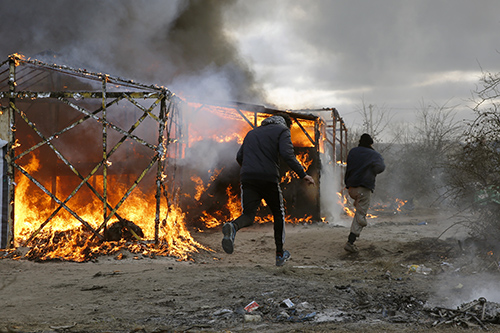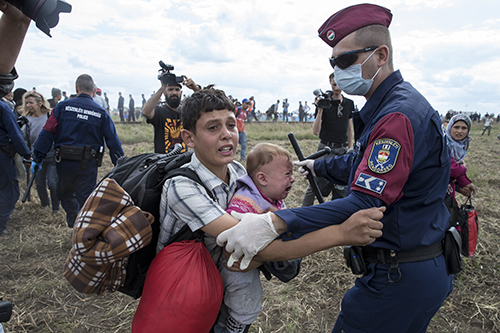“The press is not allowed in refugee centers.” The message from the Greek government could not have been clearer. “No permission will be given to television crews and reporters to enter such premises that hosts refugees,” Yannis Mouzalas, the minister in charge of immigration policy, said in a February 29 statement. In protest the Pan-Hellenic Federation of Journalists’ Unions, one of Greece’s most important media professionals’ organizations, responded by underlining that “the need for awareness of society requires showcasing all aspects of the refugee crisis, including the conditions in refugee hosting areas.”
The migration crisis has become the most compelling story in Europe. It dominates televised news with dramatic footage of migrants on rickety boats trying to reach Greek islands from the Turkish mainland, families blocked at border checkpoints in the Balkans, or expelled by the police from improvised camps in the so-called Jungle in Calais, northern France. It overwhelms papers’ political sections, op-ed pages, and forums with polemics on the confusion and division of EU policies. It floods social media with outraged or outrageous statements.
Journalists however, increasingly find themselves banned from covering the story on the ground. Last year, Hungary’s center-right government, which erected a razor-wire fence along the country’s borders with Serbia and Croatia, set the template in hampering journalists’ work. CPJ documented last year how, on a single day in September, seven journalists covering the migrant story were beaten or arrested in separate incidents by Hungarian police. Hungarian police denied attacking journalists, The Associated Press reported. The press was also banned from entering refugee camps or transit centers, with the general director of Hungary’s office of immigration telling the rights group Hungarian Civil Liberties Union the ban was to protect refugees’ privacy and security. On September 3, riot police ordered journalists to leave a railway station in Bicske, where one of Hungary’s main refugee camps is, after declaring the station an “operation zone,” the rights group reported.
Access to refugee centers has been limited in other countries too. Renate Schröder, director of the European Federation of Journalists, told CPJ, that a survey by the German Federation of Journalists of its regional offices found problems of access. “Some Länder (states) guarantee the right for information by letting journalist regularly into camps, while others restrict it. They pretend that first comes the right to privacy for the refugees and asylum seekers. There is no nationwide law, it depends on the political will at regional or local level,” she said.
European governments are wary of the political impact of the refugee crisis. Far-right movements and national populist parties are on the rise nearly everywhere in Europe and benefit from an image of governments being powerless and confused. The priority by authorities appears to be getting the story off of TV screens, especially when citizens express their fears and opposition to welcoming more migrants.
In the Netherlands, a number of towns and villages have gone so far as barring journalists from covering public asylum debates at which authorities explain to residents the decision to open refugee centers in their hometowns. In January, authorities in Luttelgeest, a village in Flevoland province, said that journalists could not come closer than 5 kilometers to such a meeting, Index on Censorship reported. “I’ve never experienced something like this before,” Allard Berends, editor-in-chief of the regional broadcaster Omroep Flevoland, told Index on Censorship. “It was just ridiculous. It was kafka-esque.” The municipality said that it wanted to prevent turmoil and provide citizens with the privacy to speak their mind. In response, the Dutch Society of Editors in Chief said: “In an open and democratic society it is up to the media to decide what to report on, how to report and what methods to use.” Sander Dekker, the Dutch State Secretary for Education, Culture and Science, supported the decision in an answer to a parliamentary question, arguing the measure was “not disproportionate.” There have been other cases of journalists’ bans too, like in the village of Heesch, part of the Bernheze municipality, where the municipal council allowed entry only to local journalists and barred cameras, according to local reports.

Journalists have a tough task covering the migration story. In improvised refugee camps like the Jungle in Calais which, until it started to be dismantled in February housed about 4,000 migrants trying to cross the Channel to the UK, and where human traffickers operate, reporting can be hazardous. In a widely reported incident, the Dutch journalists Maaike Engels and Teun Voeten were attacked on January 16 by three migrants carrying a knife and pepper spray, who tried to steal their camera. The attack was stopped by other refugees, who came to their rescue and chased away the assailants, according to reports. In such a polarized climate journalists constantly work under the suspicion, from the left of fanning discrimination and, from the right of silencing inconvenient truths. “We were criticized by liberal journalists and the refugee lobby as well as by right-wing anti-migration activists. Both sides accused us of fueling the propaganda of their opponent. Both camps urged self-censorship,” wrote Voeten and Engels.
In Germany, journalists have been booed by far-right activists with the anti-Islam campaign group Pegida (Patriotic Europeans Against the Islamization of the West). “Reporting on its rallies means diving into a hostile crowd that despises journalists as agents of a political-media traitor elite whose promotion of multiculturalism has sold the country out to an invasion of foreigners,” according to Agence France-Presse Berlin correspondent Frank Zeller. “One of their chants is ‘Luegen-Presse, auf die Fresse!’–which roughly translates to “liar-press, we’ll smash your face.”
In October, a poll of 1,209 Germans by the Allensbach Institute found that 47 percent described the reporting on refugees as “one-sided,” i.e. pro-refugees. The criticism of the press reached a high point after a series of attacks near Cologne station on New Year’s Eve when hundreds of people, particularly women, were harassed by people the victims described as of “Arab origin.” German mainstream media were accused in conservative circles of being slow in reporting the story and hesitant in linking the violence to migration. Although the events remain murky–the role of refugees in the incidents is unclear and accusations against the slowness of the press have been challenged–the idea that Germany’s public service media and elitist press are soft on migrants has received a boost among a population increasingly “losing faith in the media,” writes Der Spiegel. The leading newsweekly added: “The German nationalist magazine Compact asked readers to vote for ‘Germany’s worst lying journalists’ … The rage, hatred and hostility are not just being expressed verbally anymore. Journalists are badgered and berated, hit with flagpoles, and attacked with pepper spray.”
In mid-January a report by the EU-funded European Centre for Press and Media Freedom, which monitors attacks and supports press freedom, listed at least 49 attacks last year against the press in Germany, particularly during anti-migration rallies. On January 13, during a meeting with members of the German Parliament, Tom Strohschneider, the editor-in-chief of the left-wing Neues Deutschland, said that the number of death threats received by his staff increased heavily from the middle of 2015, the European center reported. The number of attacks has led the German Federation of Journalists to start a blog called Augenzeugen Info (Eyewitness Info) to report violence against the press.
In the toxic atmosphere triggered by the migration crisis the messengers–the journalists–are increasingly becoming the target of public anguish and anger.
- On March 4, Dunja Mijatović, the OSCE representative on freedom of the media, highlighted the need for the press to be able to report freely on refugees, and issued recommendations to OSCE states on the rights and safety of journalists covering the migrant story.
[Reporting from Brussels]
